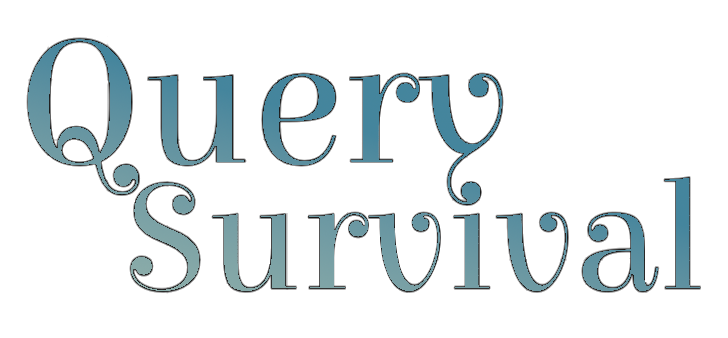Here’s a Crash Course
This is for writers who have never queried before.
We’re going to share the steps we take when we query agents. This isn’t the only way to do it. If you’ve found another approach that works for you, then query on!
If you aren’t sure where to go next, then this list is for you.

1. Celebrate!
Mark the milestone of completing your novel. You have accomplished something great! Something most people only dream of doing. So pat yourself on the back, get yourself a little gift, and party with friends — you deserve it!

2. Edit Your Manuscript
You need to polish your pages, especially the first three chapters or the first 50 pages. Make sure it’s formatted to the agent’s guidelines (usually standard manuscript format). If you can afford it, hire an editor to review the full manuscript or at least the first chapter. If you’d like to edit your book yourself, then check out Janice Hardy’s Fiction University site or Matt Bell’s excellent book, Refuse to be Done.
It’s also a good idea to get feedback from beta readers, ideally people who love reading the genre that you’ve written. And one last finicky thing is the word count. Debut authors typically need their books to fall within a specific word-count range to secure an agent and a publisher. Can you get published if your book is a lot shorter or a lot longer than the suggested range? Yes, maybe. But if you can trim (or build out) your novel to meet that requirement, it’s an easier sell for you and your future agent.

3. Write Your Query Letter
A query is a one-page sales letter introducing yourself, your novel, and your writing credentials. It should be concise, engaging, and professional, aiming to grab the agent’s interest in your manuscript.
4. Write 2 Synopses
A synopsis is a brief summary of your novel. It’s a bit like the blurb portion of the query letter, but it reveals the ending instead of ending on a hook. You will need to create a 1-page single-line spaced synopsis and then another 2- to 3-page double-line spaced version.
Your synopsis needs to be clear, concise, and compelling. You need to include the key turning points in your novel and reveal the ending. You’ll also want to cover the internal emotional arc and external plot arcs of your novel to convey the essence of your story.
5. Do Some Market Analysis & Find Comps
Oh the dreaded comps! I’m sorry to tell you that a big part of securing an agent is marketing. You have to know what genre your book is (where it would sit on the shelf in a bookstore).
Including comps (comparison titles) in your query tells agents that you have a clear understanding of your book’s potential market, including target audience and age range of your potential readers. This shows agents you understand where your book fits in the current market. So you need to find 2 comps, and they need to be current (published within the last 3 years).
Your comps also need to have one significant element that’s similar to your story (like the setting, the tone, or queer representation). Do not comp Harry Potter, the Hunger Games, or any other blow-out best seller. Do comp books that have done fairly well on Amazon or Goodreads. How well exactly? You want books with 4-star reviews that have a few thousand to several tens of thousands of sales.
You can also use another marketing trick called a mashup, which you can think of as a 1-line pitch. Mashups are often in an X-meets-Y format — like Game of Thrones meets the Hunger Games — which could be a mashup for Fourth Wing, Rebecca Yarros’s wild romantasy success from 2023.
Mashups are similar to comp titles, in that you are comparing your work to other people’s, but they differ from comps in 3 key ways:
- Mashups are used to hook the reader (comps are used to communicate marketing info to the agent).
- Mashups can include movies, TV shows, or even music (anything in pop culture), and you can use iconic bestsellers and genre classics in a mashup (comps don’t include these).
- Mashups are often in online pitch contests, and sometimes agents will ask for your 1-line pitch on their query submission form, too.
While comps are essential, Mashups are optional. So if you can’t think of one, don’t worry about it.

6. Research Agents and Agencies
Now you need to get a list together of the agents you want to query. You can search social media and the web using the hashtag #MSWL (manuscript wish list), to find agents who represent books like the one you wrote. You can also use a fantastic tool called Query Tracker (it’s not free, but it is affordable and well worth the annual fee), and Publishers Marketplace (also not free, but they have a Fast Pass that costs only $10 a day, and it provides recent book deal info, which can be very useful).
There are also websites that catalog agent’s wish lists, like MS Wishlist, but you need to check against the agency’s webpage to see if they are still looking for those types of stories, as the MSWL webpages are often out of date (what an agented wanted in 2013 isn’t what they want today). How many agents should you query? All of them — query every single agent that you’d be willing to work with who you think might be interested in your book. And look far afield. Agents in New York and London often take international clients.
How many should you query at once? The conventional wisdom is to start with 10-15 people who are fairly quick responders (you can learn how fast they respond by searching on Query Tracker), and then waiting to see if you get a request for a partial or full manuscript.
Ideally, a query for a genre with a broad readership (not too niche) should get 1 partial or full manuscript request for every 10-15 queries sent. If you aren’t getting requests, then consider revising your query letter and possibly also your opening pages.
You made it to the end of the Query Crash Course!
It it’s a lot of work, we know, but we promise that it’s doable.
And we’re here to help!
We’re building out this website as fast as we can, adding free tips and resources. We also have a mailing list that you can subscribe to if you want hints and hacks sent to your inbox.
Breathe deep, then take the leap.


